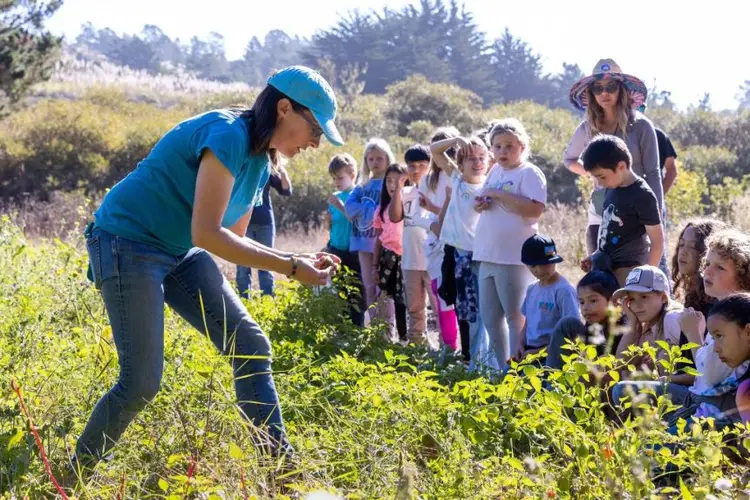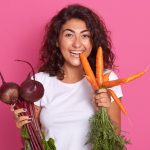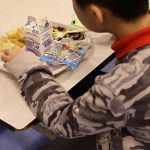It’s a good looking autumn afternoon, and 21 third-graders are studying about diet and environmental science as a part of their each day college lesson. However they aren’t sitting in a classroom. They’re wandering by way of furrows of wealthy, darkish soil, surrounded by rows of lettuce, onions, carrots and different produce on the sun-dappled San Mateo County coast.
“That is an natural farm,” says Sara Neale, their information. “Have you learnt what natural means?”
“Authentic?” mentioned one boy, shrugging his shoulders.
“It means we don’t use any chemical substances,” she says, smiling.
For the subsequent hour, the children picked cilantro, tomatoes and different produce, studying about bugs, diet and environmental science, and in the end chopping up what they harvested and consuming it on tacos they made. It’s all a part of a curriculum that continued for weeks after they returned to their classroom at El Granada Elementary College.
“Bear in mind this saying: Don’t yuk my yum,” Neale instructed them. “If any person is making an attempt one thing for the primary time, don’t say it’s gross.”
For greater than 20 years, the HEAL Undertaking, a nonprofit instructional group based mostly in Half Moon Bay, has introduced lecture rooms full of scholars to a two-acre farm simply off Freeway 1 throughout from the tiny Half Moon Bay airport and surrounded by the rolling hills of the Golden Gate Nationwide Recreation Space. The group runs applications to assist youngsters find out about science — just like the components of a plant — together with sensible recommendation on the place their meals comes from and find out how to eat more healthy.
“It’s an actual hands-on expertise,” mentioned Brett Schilke, the group’s govt director. “Children contact and really feel and check out all types of meals they may not in any other case get to see. They harvest it themselves, and make it into one thing that they eat. Typically it’s their first time on a farm, their first time chopping up greens, their first time consuming a few of these meals. It’s a means for teenagers to get in contact with the pure world and the meals they’re placing of their our bodies.”
Over the previous yr, this system served 4,100 college students, most of them 2nd, third and 4th graders from throughout San Mateo County. Of these, 3,600 youngsters participated in subject visits, and one other 500 had been within the group’s summer time day camps or backyard applications at their colleges.
General, 36% of the children got here from low-income colleges in locations like Redwood Metropolis, East Palo Alto and Daly Metropolis.
The farm visits might seem to be a easy enjoyable subject journey, however they comprise essential data that may assist youngsters find out about every part from childhood weight problems to local weather change, supporters say.
“That is long-term schooling,” Schilke mentioned. “We’re setting a basis for these youngsters that may final for years to come back. We hear an limitless stream of tales from dad and mom and the neighborhood who say “my child would by no means attempt greens, and now they’re begging me to go to the shop and purchase chard.” I used to be simply speaking to a guardian a number of days in the past who mentioned her youngsters at the moment are of their 20s, they usually say they bear in mind being right here as youngsters and what they ate.”
The group, whose acronym stands for “Well being, Environmental and Agricultural Literacy,” started in 2001 with a gaggle of Half Moon Bay dad and mom who established a faculty backyard on the San Mateo Coast. It grew, turning into a stand-alone nonprofit a number of years later, and now has 15 workers members, a board of 12 individuals, and about 90 volunteers, together with an annual price range of $768,000.
Colleges pay to go to the farm. However colleges from areas with the bottom family earnings or highest p.c of English-language learners are allowed to come back for a decrease price, or at no cost. The group is asking Want E-book donors for $25,000 to assist cowl the prices of visits from colleges in essentially the most underserved communities.
Throughout the current go to, Stacey Walsh, a third grade trainer at El Granada, mentioned visits to the farm assist her educate setting and science classes.
“Typically youngsters be taught extra by doing actions like being in nature, seeing issues, smelling issues, and tasting issues fairly than a display or a guide,” she mentioned. “You possibly can’t decide a vegetable in a guide.”
On the latest journey, after the children realized the components of a plant, and what aphids are, and the distinction between a tomato and a tomatillo, they picked produce and headed for an out of doors consuming kitchen space.
Neale handed out small knives, went over knife security suggestions, and instructed them they had been making tacos.
“You’re the chef,” she mentioned. “You resolve what to chop up and put in your taco. I urge you to attempt every part.”
They dutifully minimize every part up, rolled it into flour tortillas, and eagerly dove in.
“I like inexperienced onions,” mentioned third grader Ashley Murray. “They make every part style higher. It’s very fairly out right here. I like how one can attempt new issues. I be taught extra on the farm than within the class.”
Close by, her classmate, John Lacerda, had simply completed choosing onions, and wasn’t but satisfied he ought to eat some.
“It’s form of enjoyable,” he mentioned. “You get to find out about crops. I by no means had a tomatillo earlier than. I had by no means been to a farm earlier than this one.”
Would he eat the onions and cilantro?
“I’ll attempt a carrot,” he mentioned smiling.
Throughout the desk, his pal, Wolf Guel, was devouring his taco.
“I prefer to develop all totally different sorts of greens,” he mentioned. “They take actually excellent care of the crops right here. I realized that crops want water, solar, soil and air, and we must always handle them.”
THE WISH BOOK SERIESWish E-book is a 501(c)(3) nonprofit group operated by The Mercury Information. Since 1983, Want E-book has been producing sequence of tales through the vacation season that spotlight the needs of these in want and invite readers to assist fulfill them.
WISHDonations will assist help the The Heal Undertaking‘s farm subject journey program, together with staffing, backyard provides, instruments, kitchen components and transportation stipends. Objective: $25,000
HOW TO GIVEDonate at wishbook.mercurynews.com/donate or mail on this kind.
ONLINE EXTRARead different Want E-book tales, view pictures and video at wishbook.mercurynews.com.









